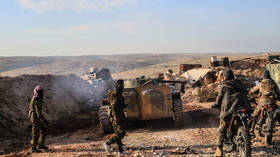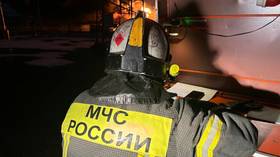Assad in Moscow after Damascus falls: As it happened

Hayat Tahrir-al-Sham (HTS) jihadists and other anti-government militias entered Damascus on Saturday, taking control over the Syrian capital. The Russian Foreign Ministry has confirmed that Bashar Assad has stepped down as Syrian president and left the country following negotiations with armed opposition groups amid the fall of Damascus to Islamist forces. Assad and his family have now arrived in Moscow, and have been granted asylum, Russian officials have confirmed.
Syrian Prime Minister Mohammad al-Jalali has already offered to cooperate “with any leadership chosen by the people,” also claiming that he remains in his home.
HTS, a group led by a former Al-Qaeda commander and previously known as Jabhat al-Nusra, launched a surprise offensive from the opposition-held province of Idlib in northern Syria last week.
Jihadists have already driven the Syrian Army from the cities of Aleppo, Hama, Homs, and Al-Qusayr at the border with Lebanon.
Other opposition and militant groups operating in Syria also seized several parts of the country. The US-sponsored Free Syrian Army (FSA) has taken control of the ancient site of Palmyra, while the Syrian Democratic Forces (SDF) also backed by the US have seized Deir ez-Zor.
This live stream has ended.
09 December 2024
17:37 GMTQatar and Egypt have condemned Israel’s seizure of land in the Syrian-controlled areas of the Golan Heights, calling it a violation of international law.
The Qatari Foreign Ministry said in a statement on Monday that it considers it “a dangerous development and a blatant attack on Syria’s sovereignty and unity…”
Egypt said the movement of Israeli tanks and infantry to the area following the overthrow of the Syrian government amounted to the “occupation of Syrian land” and a “severe breach” of a 1974 armistice deal.
Israeli Prime Minister Benjamin Netanyahu said on Sunday that he has ordered Israeli forces to grab a buffer zone in the Golan Heights established by a 1974 ceasefire agreement with Syria. The decades-old agreement collapsed when Syrian soldiers abandoned their positions, necessitating the Israeli takeover, the Israeli leader claimed.
“We will not allow any hostile force to establish itself on our border,” Netanyahu stated.
- 17:10 GMT
Türkiye and the UN have discussed the transition period in Syria and possible steps to rebuild the country, a Turkish Foreign Ministry source told Reuters on Monday.
Foreign Minister Hakan Fidan and UN Secretary-General Antonio Guterres also talked about the access of humanitarian aid into Syria, according to the report.
- 16:46 GMT
Syria’s armed opposition has announced a general amnesty for all military personnel conscripted into service under former President Bashar Assad.
“Their lives are safe and no one can assault them,” the Military Operations Department said on Telegram on Monday.
- 15:59 GMT
Three Scandinavian nations – Denmark, Sweden, and Norway – have all announced they are putting asylum decisions regarding Syrian refugees on hold, citing the “unstable” situation in the country.
“Given the situation, it is simply impossible to make a judgement on the need for protection,” the Swedish Migration Agency’s legal chief, Carl Bexelius, said in a written statement on Monday, as quoted by The Local.
The Danish Refugee Appeals Board reportedly said it was closely following developments in Syria and will discuss refugee cases at its next meeting in January.
- 15:00 GMT
Türkiye will back the reconstruction of Syria and the return of millions of refugees, Foreign Minister Hakan Fidan said on Monday.
“We will continue our work to ensure the safe and voluntary return of Syrians and for the country’s reconstruction,” Fidan told a conference of Turkish ambassadors in Ankara. Türkiye currently hosts an estimated 3 million displaced Syrians. - 13:27 GMT
Germany and Austria are suspending asylum procedures for Syrian nationals as the authorities scramble to reassess the situation after the collapse of Bashar Assad’s government, local media have reported.
According to Spiegel, Germany’s Federal Office for Migration and Refugees “issued an immediate freeze” on the decision-making process, with its spokesperson telling the magazine that it is impossible to continue handling applications “on shaky ground.” More than 47,000 asylum applications from Syrians are now pending, the article said, adding that those already exiting won’t be affected.
Austria turned out to be in the same position, according to Kronen Zeitung. The paper said that more than 12,000 Syrians have applied for asylum in the EU country this year alone.
- 13:11 GMT
Türkiye was well aware of the Syrian opposition’s plans to launch a lightning offensive, which resulted in the swift collapse of Bashar Assad’s government, Reuters has reported.
An unnamed member of the opposition told the agency that “there was no way the rebels could go ahead without first notifying” Ankara, which has been their major backer for years. The militants reportedly sent a message to Ankara – which has allegedly long opposed a major offensive on Assad loyalists and preferred a political solution – saying: “That other path hasn’t worked for years – so try ours. You don’t have to do anything, just don’t intervene.”
An unnamed Turkish official insisted that the Syrian jihadists “do not receive orders or direction from us,” adding that, “in that sense,” it would be incorrect to assume that Ankara had approved the surprise attack.
An unnamed US official told Reuters that, while Washington had been aware of Türkiye’s overall support for the opposition forces, “it was not informed of any tacit Turkish approval for the Aleppo offensive.”
- 12:11 GMT
Iran failed to send military aid and reinforcements to Bashar Assad’s government days before its collapse due to fears that Israel could intercept them, the Wall Street Journal has reported, citing Syrian officials.
They claimed that Tehran had dispatched a plane to Syria with unspecified cargo, but it “made a U-turn because of the threat of Israeli airstrikes.”
Instead, Iran ordered its troops and Tehran-aligned militia to stay out of the fight, and later “coordinated a safe exit for its personnel and cut a deal for its fighters to peacefully hand territory over to the rebels,” the article said.
Earlier, Iranian Foreign Minister Abbas Araghchi said that Tehran was “surprised” by Assad forces’ inability to contain the jihadist advance, pointing out that they had been furnished with the necessary intel to do so.
- 11:21 GMT
Former Syrian prime minister Riad Hijab could become the head of the transition government following the collapse of Bashar Assad’s government, Le Figaro has reported. This would mean that the US would avoid having to deal with Abu Mohammed al-Julani, the controversial leader of the Hayat Tahrir-al-Sham (HTS) jihadist group, the French daily reported.
Hijab, an agricultural engineer by training, was originally a member of Assad’s Ba’ath Party and was appointed prime minister in June 2012 as Syria plunged into civil strife. Less than two months later, however, he defected to the opposition and fled to Jordan. Between 2015 and 2017, he served as the head of the High Negotiations Committee, which sought to secure peace between Syria’s warring factions.












